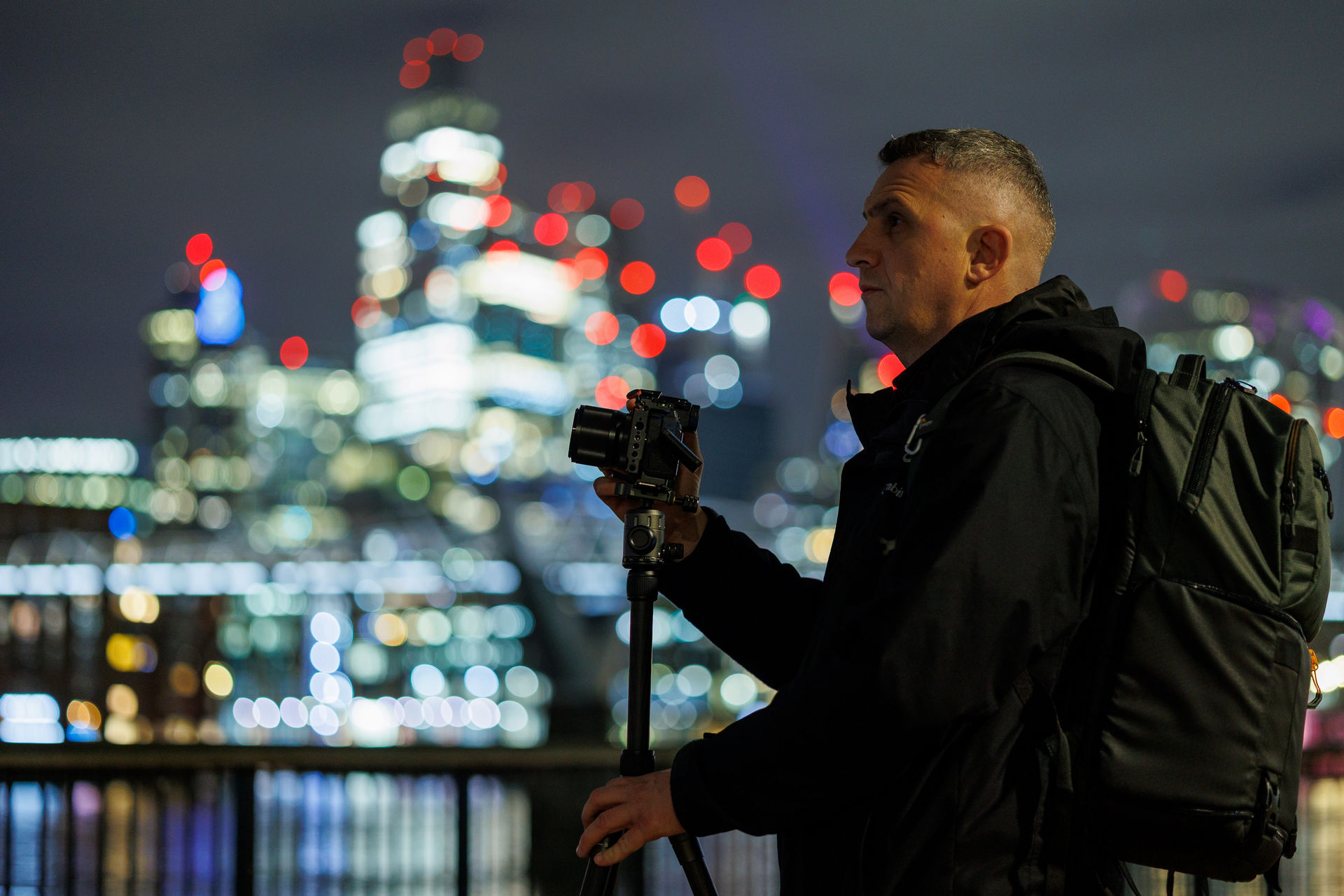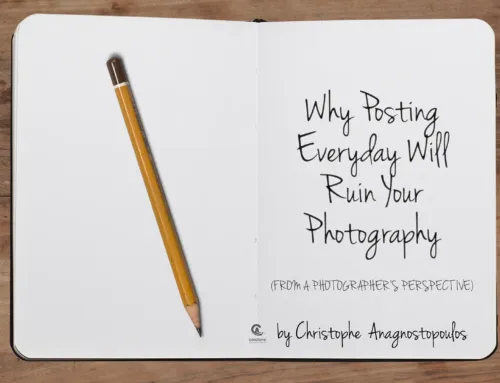Why a New Camera Will Not Heal or Improve Your Photography
2025-01-21 | ***Reading Time: 27 minutes***
This article is one of those I had to think twice before writing. The reason is simple: some truths are hard to confront. But after much thought, I decided it’s a discussion worth having.
First Things First: I Love Gear Too
Let me start by saying that I absolutely love camera gear, cameras, lenses, filters, tripods and all the super cool gadgets that most of us want to get our hands on. As a professional deeply involved in photography and filmmaking, I completely understand the temptation of getting the latest tools and technology.
Not only do I use gear extensively for my professional work, but as a reviewer, I also test and write about some of the best equipment available today. So yes, I enjoy exploring new tools that can enhance my craft.
However, here’s the key: while I appreciate my gear, I am not obsessed with it. And this distinction is crucial.

Image Credits: Zissis Tsoumpos
A Little Disclaimer
Before diving deeper, let me provide some context. Since 2017, I have the honor to be a Global Ambassador for Tokina lenses and HOYA filters. This incredible partnership has given me access to a wide range of high-quality lenses for systems like Nikon F, Sony FE & E, and Fuji X. I’m couldn’t be more grateful for the opportunity to use all those amazing gear, which make my work easier and more efficient.
That said, here’s something that might surprise you: none of this guarantees great photography.

What Cameras I Currently Use
Over the years, I’ve had the chance to work with a variety of cameras, both digital and analog. I’ve always been a Nikon user and my journey with Nikon cameras included the: D80, D90, D750, D800, D850, Z6, Z7ii, as well as some analog cameras like the Nikon F5, F100 and L35AF.
I’ve also been using Sony cameras (A5000, A7S, A7RII, and A7RIII) and Fujifilm cameras (X20, X-T3, and X-H2S).
At the time of writing this article, my current camera setup (which I’m not planning to change for the next couple of years) includes:
- Sony A7RIII: My main stills camera.
- Fujifilm X-H2S: My main video camera.
- Nikon F100: My main film camera.
- Fujifilm X20: My pocket camera.
As a side note, my A7RIII acts as a B-cam for video, while the X-H2S is my B-cam for stills.
Feel free to visit My Gear page to check the lenses I currently use as well as other accessories (filters, tripods, bags, etc).
Important Notes
- These are just my personal thoughts. I’m not claiming to be right or wrong, and you don’t have to agree with me.
- I fully acknowledge that certain gear with specific characteristics is required for particular types of photography or videography. My argument here is not about those cases but rather the occasions where people are influenced by marketing campaigns into believing that a new camera will dramatically improve their work.
Camera Is a Tool, Not a Solution
Here’s the truth: owning the best camera or the latest camera will not automatically make you a better photographer. It will not improve bad composition or bad lighting and will not give one a vision. A shiny new gadget may inspire you for a little while but will not replace skills and creativity that really define a photographer.
Very frequently, we fall into the trap of believing that the next piece of gear will do that final touch into our work. I did too, especially during my early years. But over time, I learned that the really transformative changes in my photography always came from sides of understanding light, composition, and storytelling, not from which piece of gear I had.

The Photographer Creates the Image, Not the Camera
Many of the most important pictures in history have been taken using equipment that today would qualify as antiques. A simple Nikon model F, a Leica M3, or a Hasselblad 500CM, cameras with no autofocus, no built-in stabilization, no high ISOs, all could have produced true masterpieces.
Why? Because the photographers mastered the art of seeing in a way that made it possible to narrate and capture moments.
In my workshops, I’ve found participants coming with the latest, ultra-advanced gear only to find that their problems are not with high-end technology but with technique. In contrast, I have come across photographers with very simple equipment producing amazing work simply because they had the know-how of using what they had.

The Tank Man (1989)
©Jeff Widener

Captured with a Nikon FE2 & a Nikkor 400mm 5.6 ED-IF lens with TC-301 teleconverter.
A humorous example I often use is this:
Imagine you’re having a dinner at a fantastic restaurant and enjoying a delicious plate. At some point, the chef comes over to your table to ask if you’re enjoying the food. Would you ever respond with something like, “This food is amazing, you must have an incredible oven!”?

The Camera You Have Is Enough
I often tell participants in my workshops: the best camera is the one you have with you. In other words, you don’t need a 60-megapixel sensor with 8K video performance to create something meaningful. What you need is to learn and understand how to maximize the potential of the tools at your disposal and the confidence to push your creative boundaries.
Looking back on my own journey, I would say that among my favorite images are not necessarily those taken with the latest of gear. Instead, they were the result of patience, preparation, and a willingness to experiment.
Focus on What Matters
Instead of chasing the next camera, consider investing in things that truly improve your skills and creative process:
- Education: Attend workshops, read books, or watch tutorials to learn about light, composition, and storytelling.
- Practice: Spend time with your camera, experimenting with different settings and styles.
- Feedback: Share your work with others and invite constructive criticism.
In these areas there can be true growth in your photography, not with the specifications of your gear.
There are countless photography workshops available where you can learn new techniques, practice your skills, explore stunning locations, and connect with fellow photographers.
As someone who has been offering photography workshops for the past eight years, it wouldn’t be appropriate for me to recommend specific ones. However, a quick Google search will provide you with plenty of options to explore.
That said, I strongly encourage you to allocate some time (and part of your budget) to investing in photo books. These are, in my opinion, one of the best ways to learn and find inspiration. Through the work of renowned photographers, you can gain valuable insights into composition, storytelling, and creative vision.
Here are two of my favorites:


A Real-World Example
Let’s see a real world example, using the Nikon D800, a camera released in 2012. By today’s standards, it might seem like an ancient artifact. No flippy screen, no IBIS, AF wasn’t ideal and so on. However, despite all the “lack” of features, I can assure you that it can still create amazing photos even today. Cameras like the D800 are a testament to the idea that great photography isn’t about having the latest technology, it’s about how you use what you already have.
A Personal Note to Camera Manufacturers
While advancements in video technology are undeniable, I strongly feel that in terms of still photography, not much has changed the last decade.
Camera manufacturers (through clever marketing) make us believe that nowadays the only spec that matter is Autofocus performance and AF Tracking and all those fancy AI algorithms that detect the eyes of an ant, but in reality other features matter more. In example, dynamic range and noise performance haven’t progressed significantly and, in some cases, have even regressed due to stacked and global sensors designs.
Cameras Are Important, But Lenses Matter Even More
Let’s not misunderstand each other: having a capable camera body is important. A good camera provides you with the features, controls, and reliability needed to bring your creative vision to life. It’s the tool that translates your ideas into results.
However, it’s equally, if not more, important to focus on your lenses. After all, the lens is the gateway through which light reaches the camera sensor. A high-quality lens can elevate your work, offering superior sharpness, contrast, and creative options that even the best camera body can’t compensate for.
So, before you rush to upgrade your camera, ask yourself: Am I fully utilizing the potential of my lenses? Or could I achieve even better results with the right glass?
I’ll dive deeper into why lenses play such a critical role in photography and how to choose the right ones for your work in an upcoming post, stay tuned!
Conclusion
Don’t get me wrong: having great gear is fantastic, and I’m fortunate to work with some of the best tools available. But over the years, I’ve learned that a new camera won’t “heal” your photography.
If you want to improve as a photographer, the answer lies not in your equipment but in your vision, creativity, and commitment to learning. Master these, and you’ll find that the camera you already own is more than enough to create incredible work.










Leave A Comment